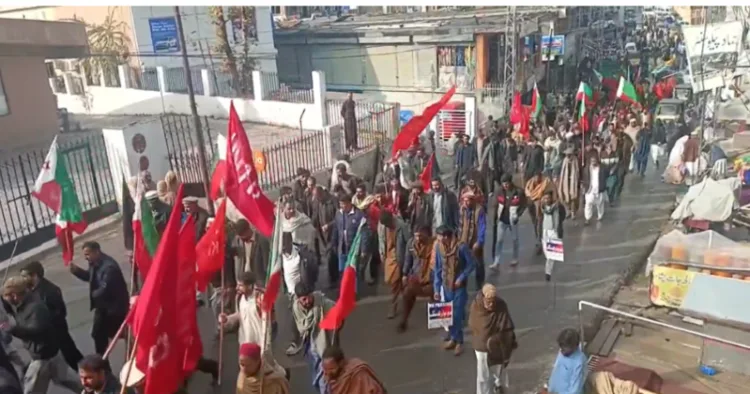Massive protests in Pakistan Occupied Jammu Kashmir (POJK) on Sunday, December 8 forced the government to withdraw a presidential ordinance called the Peaceful Assembly and Public Order Ordinance 2024. Earlier, thousands of demonstrations in all districts had threatened to march on to Muzaffarabad as a mark of solidarity against the ordinance. They had gathered in response to mobilisation by the Jammu Kashmir Joint Awami Action Committee (JKJAAC) coalition.
The government also accepted several demands of the Jammu Kashmir Joint Awami Action Committee (JKJAAC) coalition which had given the government time up to Sunday to withdraw the draconian ordinance. Incidentally, the ordinance was similar to a law enacted by the Federal government and is in force in Pakistan. This law is being used all across Pakistan to quell protests by declaring them unlawful and putting the demonstrators in jail.
The law allows the government to deny permissions for protests and then crack down on defiant human rights defendants and charge them with anti-terror laws. By noon, the government team handed over the Law Department’s notification, officially withdrawing the ordinance, according to a report of Dawn newspaper.
The government was also forced to issue notifications for the release of all detainees and the reinstatement of a teacher named Arif who had been dismissed earlier. The notification also says that the payment of electricity arrears will now have to be in 36 instalments instead of 24, and revised tariffs for 5KW commercial and general service categories.
The first to blink was President Barrister Sultan Mahmood who announced that he had directed Prime Minister Chaudhry Anwarul Haq to withdraw the ordinance. However, PM Haq resisted doing so, apparently on instructions from Islamabad and sought time till Tuesday to consider the demands of the the Jammu Kashmir Joint Awami Action Committee (JKJAAC) leaders. This was outright rejected by the protestors and they doubled up their efforts at mobilisation late on December 6 and 7, 2024.
Several locations in Rawalakote, Sadnoti, Bagh, Palundri, Brarkot, Kohala and Haveli then saw massive gatherings on Saturday with canopies being erected. These canopies offered poor protection against harsh weather but were better than being exposed to the harsh weather out in the open. The demonstrators also used their personal vehicles as shelters and to keep themselves warm.
By late Saturday, those leading the protesters announced plans to march towards Muzaffarabad in a coordinated manner on Sunday from all sides. They were demanding the abrogation of the ‘Peaceful Assembly and Public Order Ordinance, 2024’, which barred unregistered organisations from holding gatherings or protests and mandated registered groups to seek permission a week before their planned gatherings.
This was basically a move to smother all dissent and sensing the growing public resentment, the PPP, a coalition partner in the POJK government, was the first to reject the ordinance during its meeting in Karachi. Interestingly, all PPP ministers in the coalition government had approved and pressed for the issuance of the presidential ordinance earlier.
Once PPP did a volte face, in trying to protect itself from facing public opposition, the regional president of PML-N Shah Ghulam Qadir also started saying that his party wanted the ordinance to be rolled back.
On Sunday also, like it had happened for many days earlier, the shopkeepers and business establishments refused to open them. The impact of this was very visible in POJK capital Muzaffarabad too, the nerve centre and seat of the state government.
At 9 am on Sunday, an official team, comprising Health Minister Nisar Ansar Abdali, Information Secretary Sardar Adnan Khurshid, Poonch Commissioner Sardar Waheed Khan, and DIG Shehryar Sikander, arrived in Kohala for formal negotiations, resulting in a written agreement in which the government accepted not only the primary demands, but also several other points.
The agreement included a commitment to withdrawing all cases against activists within seven days to three months, reinstatement of dismissed teacher Sohaib Arif in Poonch, permanent employment for the brother of Azhar, who was killed on May 13 when the police fired at the demonstrators. A compensation of Rs 10 lakh each will be given to within a week to four others who were injured in this gruesome incident of brutality by the government forces.
According to the agreement, those people whose houses were affected by raising the height of the Mangla Dam upraising would not have their electricity bills waived. Besides, flour quality would be improved with allocations taking into account populations of different areas. Massive protests on non-availability of wheat flour on subsidised rates had nearly brought down the Haq government some months ago. The intervention of Pakistan Prime Minister Shehbaz Sharif who announced massive subsidy package had helped diffuse the situation at that time.
It also stated that a six-month dialogue would address the JKJAAC’s separate ‘Charter of Demands’ without further amendments. Meanwhile, POJK PTI’s regional president and former PM Sardar Abdul Qayyum Niazi has demanded immediate resignation of the coalition government, followed by fresh polls.
Joining him, PML-N leader and former PM Raja Farooq Haider has also demanded the resignation of incumbent Prime Minister Haq. “The withdrawal of the ordinance is like a post-mortem cure, apart from being evidence of the hybrid regime’s failure,” he said in a statement.



















Comments